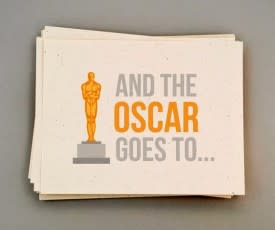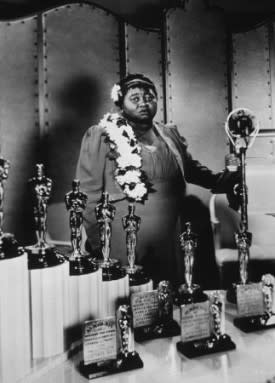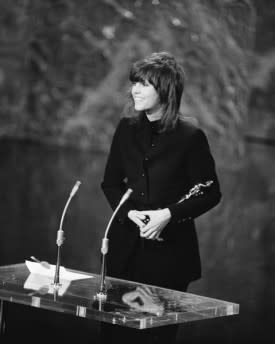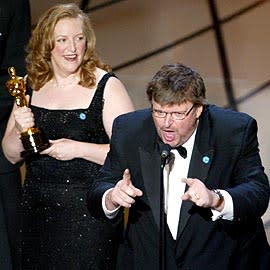OSCARS: New TCM Documentary Uncovers Academy Awards As They Have Never Been Seen Before
Fans of the Oscars should be in hog heaven over TCM‘s terrific new 95-minute documentary chronicling the Academy Awards from their inception 86 years ago to the present. The film, And The Oscar Goes To…, premieres Saturday and is perhaps the most thorough and detailed look at the Oscars yet done — at least anything actually sanctioned on this scale by the Academy. To do something like this requires the complete cooperation of the Oscar gods, and filmmakers Rob Epstein and Jeffrey Friedman (Common Threads: Stories From The Quill, The Celluloid Closet) got it. There is tons of rare footage, both onstage and back at most of the past Oscar ceremonies reaching all the way to the first when it was held in 1929 at the Hollywood Roosevelt Hotel.
According to Epstein, it was then-Academy President Tom Sherak who was their knight in shining armor in getting the docu project off the ground. As I was interviewing him on Tuesday, news broke that Sherak had died. Epstein, who also serves as an Academy Governor in the Documentary Branch, wanted to make sure Sherak got due credit. “I just want to say that for me personally there is no greater tribute to Tom than having worked on this film, because if it weren’t for him it wouldn’t be. I went to him with the idea and five minutes of footage and he said, ‘We are going to make this happen,’ and he did. That was three years ago. He got it right away, he embraced it, he said you’re the guy to do it. He said he was going to take it to the board, and he presented that trailer I showed him to the board, and everyone agreed that this was the kind of thing we should support,” he said.
In fact there are numerous board members past and present who submitted to interviews about Oscar and the impact on their careers and craft — including Tom Hanks, Annette Bening, Kathleen Kennedy, Michael Moore, screenwriter Phil Alden Robinson, visual effects governor Craig Barron, costume designer Jeffrey Kurland, and former executive director of the Academy Bruce Davis, who delivers much of the historical information and anecdotes. Current Academy President Cheryl Boone Isaacs is also featured in the section discussing race and the Oscars — particularly the first black Oscar winner, Hattie McDaniel (for Gone With The Wind). In fact what makes the sweeping look at the Oscars so effective is that it is broken into specific sections including stars talking about getting their Oscar-winning roles, controversies, documentaries, the Blacklist, social trends and their effect on the Academy, crafts categories, Oscar hosts, the advent of television, Oscar losers, honorary Oscar winners, acceptance speeches, Best Pictures, and on and on.
The docu focuses as much on the films and filmmaking process as it does on the actual Oscar shows themselves. It seems to be the thrust of the whole thing. ”That’s what was interesting to us when we started talking to people and interviewing them about their experiences,” Friedman said. “You can only go so far with the experience of getting nominated and winning and all that. But when people started talking about the work they did that got them to that point it was very inspiring to see how passionate and articulate people were. That led us in that direction.” Particularly compelling are interviews with the likes of Ellen Burstyn, Whoopi Goldberg, Cher, George Clooney, Jon Voight, Helen Mirren and Jane Fonda among others. Fonda movingly talks about accepting the On Golden Pond Oscar for her ailing father Henry and is fascinating in talking about her own first Oscar-winning role in Klute, from her insecurities about taking on the role of the prostitute in the first place to her conflicted feelings about her acceptance speech during the height of the Vietnam War. Along those lines, Moore’s recollection about his own feelings regarding what he would say after winning for Bowling For Columbine is priceless stuff. He says he didn’t know whether to embrace the Oscar and thank his stylist or blast then-President George W. Bush as he was walking up to accept. The film clearly shows which path he chose.
So much of it is weaved together with backstage moments and interviews that are rarely seen by the public and it gives a great context to the whole experience. In fact, the initial idea was to do a docu about the Oscar press room since there was a company that had exclusive access to all of that for decades and owned all this rarely if ever-seen footage. It gives a real context and flavor that past looks at Oscar have not achieved. “We saw maybe 30 minutes of raw 16mm material and were smitten,” said Epstein. “But we thought if we were going to do something backstage, we should do something in front of the stage too.” Epstein added that they told the Academy and TCM — which came on board to back it — that they wanted to do it as independent filmmakers. He says they got carte blanche to do what they want.
One area the film does not get into at all is campaigning and the politics of Oscar. The filmmakers, who live in San Francisco, said maybe because they are not part of the Hollywood scene that that was one aspect of the Academy Awards that was the least interesting to them. “I guess that really was a choice in that we were more interested in the humanity of the Oscars and less the business of it,” Epstein said. “Somebody could have done a whole other kind of film but that really wasn’t the one we were interested in making.”
Among the things missing from the docu that Oscar fans might have expected to see are the infamous streaker episode in 1974, Jack Palance doing pushups, and any mention at all of the disastrous Allan Carr-produced Oscars in 1989. That was the one where Rob Lowe famously sang with Snow White among other embarrassments. There’s very little emphasis on the often-criticized musical numbers over the years as well. I could have done without seeing the cringe-inducing clip of an aged Bette Davis losing her way as a Best Actor presenter in 1987, but in general the footage chosen is right on the nose. I really got a kick out of seeing Hermione Gingold hilariously accept a screenplay Oscar on behalf of an absent winner — S.J. Perelman for Around The World In 80 Days – on the 1957 show, which she completely steals. ”When we found that clip, it was worth getting the whole job,” laughed Epstein. In those days the Academy allowed stand-ins for absent winners and in this case it was much better than having the actual recipient. I miss this kind of spontanaeity on modern-day Oscar shows that seem to be in a race with the clock. Epstein and Friedman do a fine job of unearthing unseen gems like this.
“In general our criteria was to use clips that weren’t overly familiar or that you would expect to see on a best-of Oscar show. We were looking for moments that fit into our narrative that we were trying to construct so that helped us pare away some things,” said Friedman. Epstein elaborated: ”There were a few moments that people are familiar with that we felt warranted being looked at in a new light, purely as documentary elements, like Sacheen Littlefeather (who famously turned down Marlon Brando’s 1972 Godfather Oscar), who is always presented as kind of a joke, but if you look at the actuality of the moment I saw it in a whole other way than how it had been presented before”, he said. “Tracking the Oscars is like a mirror of cultural shifts as reflected in both the show and the movies. The degree to which we were able to mine that we weren’t originally sure. In fact looking at all these shows over the decades you can see that kind of outline.”
Ironically , even though the doc is titled And The Oscar Goes To… they don’t explain that the phrase actually was instituted by Carr for that otherwise widely panned ’89 Oscar show. The Academy wanted to get rid of the word “winner” when the envelope was opened, and it has stuck ever since. This winning documentary will be playing throughout the month of February on TCM as part of the classic movie network’s “31 Days Of Oscar” programming.
Related stories
OSCARS: Best Animation 2013 – Titans Vs. Indies In A Wide Open Race
OSCARS Q&A: Kate Winslet On 'Labor Day'
Get more from Deadline.com: Follow us on Twitter, Facebook, Newsletter




